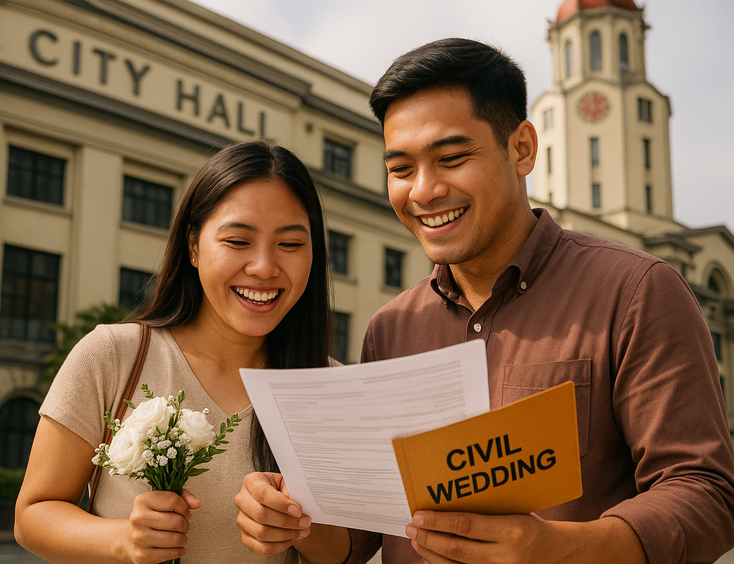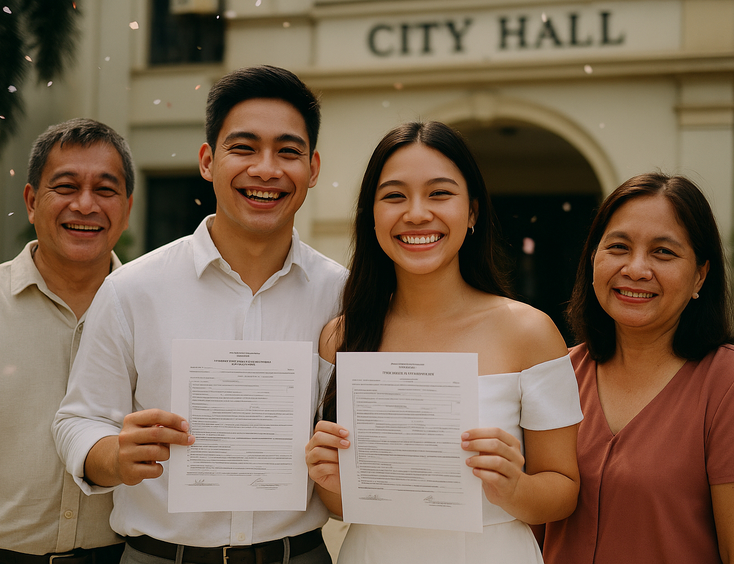
Civil Wedding Cost in the Philippines - Judge vs Mayor vs Court Fees

Civil weddings are lean, fast, and flexible—but the total depends on who solemnizes, where you hold the rites, and how you shape the short program that follows. Use this guide to forecast fees, set timelines, and avoid paperwork bottlenecks while keeping the celebration elegant.
What affects the price
- Solemnizer honorarium: varies by judge, mayor, or court-scheduled ceremony; travel or off-hours surcharges may apply.
- Venue choice: city hall or courtroom (often minimal cost) vs a private space or hotel suite (rental plus ingress rules).
- Marriage license & documents: fees differ by LGU; some require seminars and waiting periods.
- Program extras: rings, simple florals, music, and a short reception or lunch.
If you prefer a private ceremony time with clear paperwork support, start by reserving a licensed solemnizer who handles city requirements smoothly: connect with a city-certified civil celebrant.
Judge vs mayor vs court calendar
Judge
- Often handled via the Hall of Justice; calendars fill quickly.
- Honorarium ranges by city and schedule; outside-venue solemnizations add transport and per-diem.
Mayor
- Subject to LGU availability and event load; may require a formal letter and set presentation times.
- Rates vary; some LGUs waive or reduce fees for residents.
Court-scheduled group rites
- Lowest cost and fastest timeline, but less control over date/time and guest count.
- Typically held on-site with limited styling.
If you’re weighing a church path for tradition or family reasons, compare the timelines and paperwork side-by-side: review a parish-based route with updated requirements.

Paperwork checklist and lead times
- Marriage license from your Local Civil Registrar (processing window and seminar requirements vary).
- CENOMAR/civil status documents as required by your LGU.
- Valid IDs and photos per city hall specs.
- Affidavits/parental consent where applicable.
- Venue permissions if holding the ceremony outside government premises.
Planning an out-of-town signing or mixing the civil rite with a destination dinner Make space for permit windows and license validity: sort out license timing and destination approvals.
Budget snapshots you can adapt
| Scenario | Core spend | Notes |
|---|---|---|
| City Hall Minimal | ₱ | License + honorarium + simple rings; photos after signing |
| Hotel Suite Private | ₱₱ | Suite rental or day-use + travel for solemnizer + light styling |
| Garden Micro-Reception | ₱₱₱ | Venue fee + F&B per head + sound system + short program |
Your biggest lever is the guest count for any meal. Keep the program tight to avoid overtime and add-ons.
If you need a small, tasteful setting that photographs well and keeps logistics simple, consider intimate spaces that welcome civil rites: look into quiet rooms and gardens suitable for a short ceremony.

Flow and etiquette
- Arrival and document check with the solemnizer
- Opening remarks and legal vows
- Ring exchange and signing of the register
- Short message, then quick portraits
- Optional lunch or cocktails
Keep music compact (portable speaker, curated playlist) and décor minimal (bouquet, compact arrangement). If you plan portraits after the signing, book a documentary-first visual team for efficient coverage: shortlist storytellers who move fast in tight spaces.
Common pitfalls
- Applying for the marriage license too early or too late versus ceremony date
- Missing IDs or photos with the exact specs required by your LGU
- Assuming the solemnizer can travel without checking fees, curfews, or security protocols
- Booking a venue with restrictive ingress that clashes with your schedule
Simple timeline that works
30–45 days out: Pick judge/mayor/court pathway; gather civil documents.
15–30 days out: Apply for license; finalize ceremony venue; coordinate solemnizer availability.
7–10 days out: Confirm witnesses, print copies of IDs, align arrival and parking.
2–3 days out: Prepare rings, bouquet, and a one-page program; test your playlist and speaker.
Day-of: Arrive early with all paperwork; keep portraits within the venue’s allowed window.

Fees to clarify upfront
- Honorarium and what it covers (travel, off-hours, weekend)
- Where the signing occurs and who provides the registry book
- Any requirement for municipal guards or marshals in public spaces
- If the solemnizer allows personalized vows or readings within a strict time cap
For a broader view of how a civil ceremony fits into the entire wedding budget—including percent splits and regional variances—anchor decisions to a national framework: ground the numbers with a countrywide cost breakdown.
Quick add-ons that elevate the day
- A small bouquet and boutonnière; reuse them for lunch portraits
- A minimal arch or backdrop that sets scale without heavy rentals
- A short toast and cupcake or petite cake moment after the signing
If your time is tight and you want one point person for paperwork follow-ups, vendor calls, and run-downs, consider a logistics-strong partner who handles civil timelines end-to-end: tap a coordinator who keeps city hall schedules on track.
Find Your Perfect Wedding Supplier Today!
Discover trusted wedding suppliers across the Philippines in our complete directory. Compare services and connect with the ones that fit your dream celebration.
Browse Wedding Suppliers



